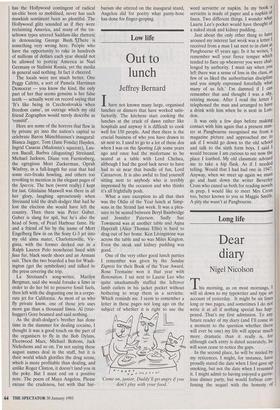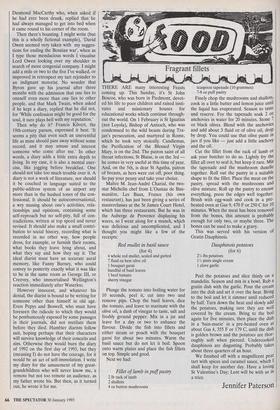Long life
Dear diary
Nigel Nicolson
This morning, as on most mornings, I will sit down to my typewriter and type an account of yesterday. It might be six lines long or two pages, and sometimes I do not write it at all if nothing special has hap- pened. That's my first admission. To any future reader of my diary (and I'll come in a moment to the question whether there will ever be one) my life will appear much more dramatic than it really is, for although each entry is dated accurately, he will soon cease to notice the gaps. In the second place, he will be misled by my reticences. I might, for instance, have proudly stated the date when I first gave up smoking, but not the date when I resumed it. I might admit to having enjoyed a garru- lous dinner party, but would forbear con- fessing the sequel with the honesty of Desmond MacCarthy who, when asked if he had ever been drunk, replied that he had always managed to get into bed when it came round to his corner of the room.
Then there's boasting. I might write (but this is a wholly fictional example), 'David Owen seemed very taken with my sugges- tions for ending the Bosnian war', when as I type those mendacious words I visualise Lord Owen looking over my shoulder in search of more congenial company. I might add a mile or two to the five I've walked, or improved in retrospect my tart rejoinder to an indignant motorist. No wonder that Byron gave up his journal after three months with the admission that one lies to oneself even more than one lies to other people, and that Mark Twain, when asked if he kept a diary, replied that he did not, for 'While confession might be good for the soul, it sure plays hell with my reputation.'
Then why do it? Francis Kilvert, the 19th-century parson, expressed it best: 'It seems a pity that even such an uneventful life as mine should pass away without some record, and it may amuse and interest someone who come after me.' In other words, a diary adds a little extra depth to living. In my case, it is also a mental exer- cise, like jogging before breakfast. One should not take too much trouble over it. A diary is not a work of literature, nor should it be couched in language suited to the public-address system of an airport any more than in the hushed tones of the con- fessional. It should be autoconversational, a wry musing about one's activities, rela- tionships and opinions, containing some self-reproach but no self-pity, full of con- tradictions, written at top speed and never revised. It should also make a small contri- bution to social history, recording what is recorded in no other way, how people dress, for example, or furnish their rooms, what books they leave lying about, and what they say and how they say it. The ideal diarist must have an accurate aural memory, like Fanny Burney, who could convey to posterity exactly what it was like to be in the same room as George III, or Creevey, who immortalised Wellington's reaction immediately after Waterloo.
However innocent, and whatever his denial, the diarist is bound to be writing for someone other than himself in old age. Even Pepys and Boswell, who must have foreseen the ridicule to which they would be posthumously exposed by some passages in their journals, did not mutilate them before they died. Humbler diarists follow suit, hoping perhaps that their characters will survive knowledge of their conceits and sins. Otherwise they would burn the diary of 1992 on the first day of 1993, but they (meaning I) do not have the courage, for it would be an act of self-immolation. I write my diary for the amusement of my great- grandchildren who will never know me, a remote but not too remote an audience, as my father wrote his. But then, as it turned out, he wrote it for me.











































































 Previous page
Previous page